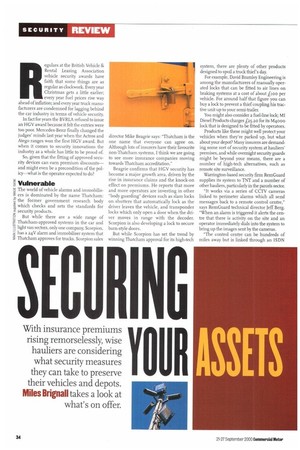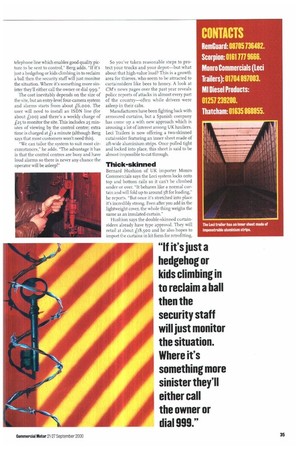SECURING
Page 36

Page 37

If you've noticed an error in this article please click here to report it so we can fix it.
YOUR
ASSETS
Regulars at the British Vehicle & Rental Leasing Association vehicle security awards have faith that some things are as regular as clockwork. Every year Christmas gets a little earlier; every year fuel prices rise way ahead of inflation; and every year truck manufacturers are condemned for lagging behind the car industry in terms of vehicle security.
In fact for years the BVRLA refused to issue an HGV award because it felt the entries were too poor. Mercedes-Benz finally changed the judges' minds last year when the Actros and Atego ranges won the first HGV award. But when it comes to security innovations the industry as a whole has little to be proud of.
So, given that the fitting of approved security devices can earn premium discounts— and might even be a precondition of the policy—what is the operator expected to do?
Vulnerable
'Et The world of vehicle alarms and immobilis
ers is dominated by the name Thatcham: F, the former government research body which checks and sets the standards for g security products.
r, But while there are a wide range of Thatcham-approved systems in the car and nlight van sectors, only one company, Scorpion, has a z4V alarm and immobiliser system that Thatcham approves for trucks. Scorpion sales
director Mike Beagrie says: "Thatcham is the one name that everyone can agree on. Although lots of insurers have their favourite non-Thatcham systems, I think we are going to see more insurance companies moving towards Thatcham accreditation."
Beagrie confirms that HGV security has become a major growth area, driven by the rise in insurance claims and the knock-on effect on premiums. He reports that more and more operators are investing in other "body guarding" devices such as slam locks on shutters that automatically lock as the driver leaves the vehicle, and transponder locks which only open a door when the driver moves in range with the decoder. Scorpion is also developing a lock to secure barn-style doors.
But while Scorpion has set the trend by winning Thatcham approval for its high-tech system, there are plenty of other products designed to spoil a truck thief's day.
For example, David Bramley Engineering is among the manufacturers of manually operated locks that can be fitted to air lines on braking systems at a cost of about Lic)c) per vehicle. For around half that figure you can buy a lock to prevent a thief coupling his tractive unit up to your semi-trailer.
You might also consider a fuel-line lock; MI Diesel Products charges f25.2o for its M4000 lock that is designed to be fitted by operators.
Products like these might well protect your vehicles when they're parked up, but what about your depot? Many insurers are demanding some sort of security system at hauliers' premises, and while overnight security guards might be beyond your means, there are a number of high-tech alternatives, such as remote site surveillance.
Warrington-based security firm RemGuard supplies its system to TNT and a number of other hauliers, particularly in the parcels sector. "It works via a series of CCTV cameras linked to perimeter alarms which all send messages back to a remote control centre," says RemGuard technical director Jeff Berg. When an alarm is triggered it alerts the centre that there is activity on the site and an operator immediately dials into the system to bring up the images sent by the cameras.
"The control centre can be hundreds of miles away but is linked through an ISDN telephone line which enables good quality picture to be sent to control," Berg adds. "If it's just a hedgehog or kids climbing in to reclaim a ball then the security staff will just monitor the situation. Where it's something more sinister they'll either call the owner or dial 999."
The cost inevitably depends on the size of the site, but an entry-level four-camera system and alarms starts from about f6,000. The user will need to install an ISDN line (for about L100) and there's a weekly charge of £25 to monitor the site. This includes 25 minutes of viewing by the control centre; extra time is charged at p a minute (although Berg says that most customers won't need this).
We can tailor the system to suit most circumstances," he adds. "The advantage it has is that the control centres are busy and have loud alarms so there is never any chance the operator will be asleep!"
So you've taken reasonable steps to protect your trucks and your depot—but what about that high-value load? This is a growth area for thieves, who seem to be attracted to curtainsiders like bees to honey. A look at GM's news pages over the past year reveals police reports of attacks in almost every part of the country—often while drivers were asleep in their cabs.
Manufacturers have been fighting back with armoured curtains, but a Spanish company has come up a with new approach which is arousing a lot of interest among UK hauliers. Leci Trailers is now offering a two-skinned cutainsider featuring an inner sheet made of 2ft-wide aluminium strips. Once pulled tight and locked into place, this sheet is said to be almost impossible to cut through.
Thick-skinned
Bernard Hushion of UK importer Monro Commercials says the Leci system locks onto top and bottom rails so it can't be climbed under or over. "It behaves like a normal curtain and will fold up to around 3ft for loading," he reports. "But once it's stretched into place it's incredibly strong. Even after you add in the lightweight cover, the whole thing weighs the same as an insulated curtain."
Hushion says the double-skinned curtainalders already have type approval. They will retail at about £18,500 and he also hopes to import the curtains in kit form for retrofitting.












































































































